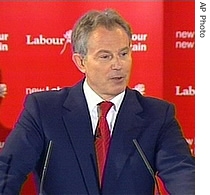2007年VOA标准英语-Outgoing British PM Blair's Foreign Policy Mark(在线收听)
Washington
25 May 2007
British Prime Minister Tony Blair leaves office on June 27. In this report from Washington, Senior Correspondent André de Nesnera looks at Mr. Blair's legacy in foreign affairs, a legacy largely defined by his support of the war in Iraq.
 |
| Prime Minister Tony Blair announces that he will step down as prime minister on June 27, 10 May 2007 |
Many analysts say his decade in office will be forever marked by his decision to back the U.S.-led invasion of Iraq, coupled with his unwavering support of President George Bush, support that earned him the nickname, in some British quarters, of "Bush's poodle."
In a departure from the long-standing custom for a former U.S. president not to criticize a close ally, former U.S. President Jimmy Carter, in a recent interview on May 19 with British radio, used strong words in describing Mr. Blair's support for Mr. Bush.
"Abominable. Loyal. Blind - apparently subservient," he said. "And I think the almost undeviating support by Great Britain for the ill-advised policies of President Bush in Iraq have been a major tragedy for the world."
Throughout his premiership, Mr. Blair argued that the world is better off now that Saddam Hussein is no longer in power. And he said the United States and Britain should not let the budding democracy in Iraq fail.
Many experts, including British historian Andrew Roberts, say strong opposition to the war in Iraq from within Blair's own Labor Party and from the British public in general, has effectively forced his early retirement, despite a third consecutive election victory in May 2005.
"Now usually prime ministers stay on for four or five years; you don't have to hold elections for five years in this country," said Roberts. "He's going within two years and that's primarily because of his support for the Iraq war and for Mr. Bush."
"Those of us who believe that it was the right thing to have done to have overthrown Saddam and to have fought the Iraq war think it's a great shame that a man should have been effectively forced out of office early because of that. However, there is no doubt that that was one of the reasons that he's leaving so early," he added.
Many British experts have criticized Mr. Blair for not exerting more influence on President Bush.
Jerry DeGroot, history professor at St. Andrew's University in Scotland, says that was Mr. Blair's biggest failure.
"It almost has a sort of Shakespearian tragedy about it, because I would even gather that the American people probably wanted Blair to have a moderating influence upon Bush," Degroot said. "But I think it simply reveals what probably previous prime ministers of Britain have realized, is that Britain simply doesn't pack the punch to be a moderating influence upon the United States, and particularly when there is a president in the White House who is dead set on a certain course."
During his speech earlier this month announcing he will leave office June 27, Mr. Blair defended his decision to stand shoulder to shoulder with President Bush following the September 11, 2001 terrorist attacks on the United States.
"And so Afghanistan and then Iraq -- the latter, bitterly controversial," said Blair. "And removing Saddam and his sons from power as with removing the Taleban, was over with relative ease."
"But the blowback since from global terrorism and those elements that support it has been fierce and unrelenting and costly. And for many it simply isn't and can't be worth it. For me, I think we must see it through. They, the terrorists who threaten us here and around the world, will never give up if we give up. It is a test of will and of belief, and we can't fail it," he continued.
When Tony Blair relinquishes power in late June, Gordon Brown will replace him as prime minister. Experts do not expect any major shift in British policy regarding either Afghanistan or Iraq.
But they do say Brown will try to distance himself from President Bush while keeping the so-called "special relationship" between Washington and London on a more even keel.